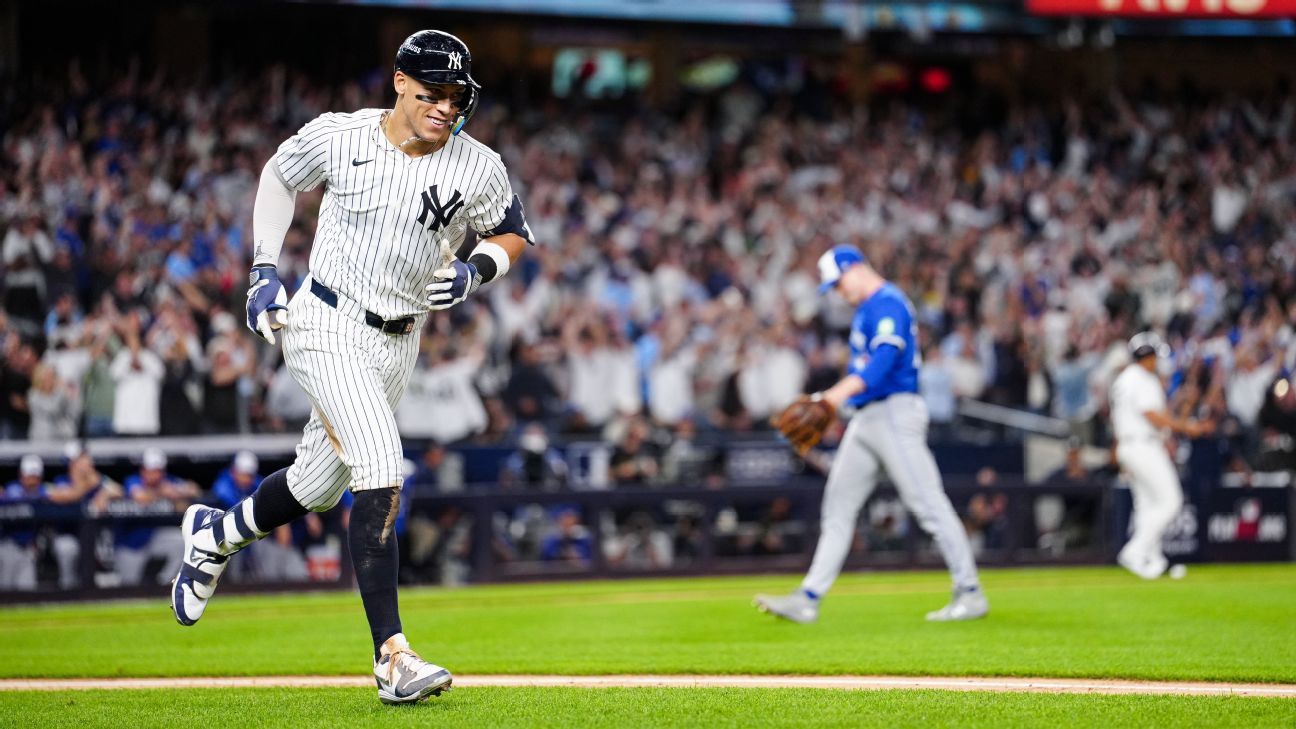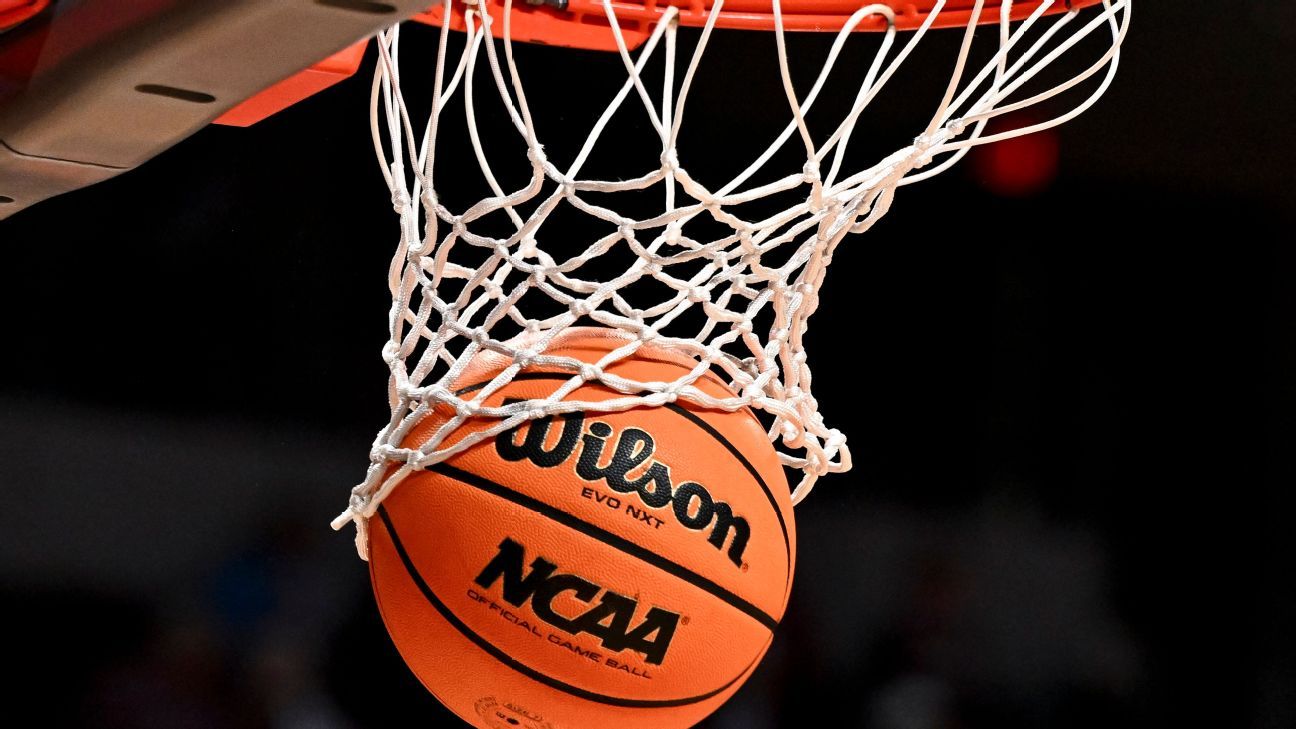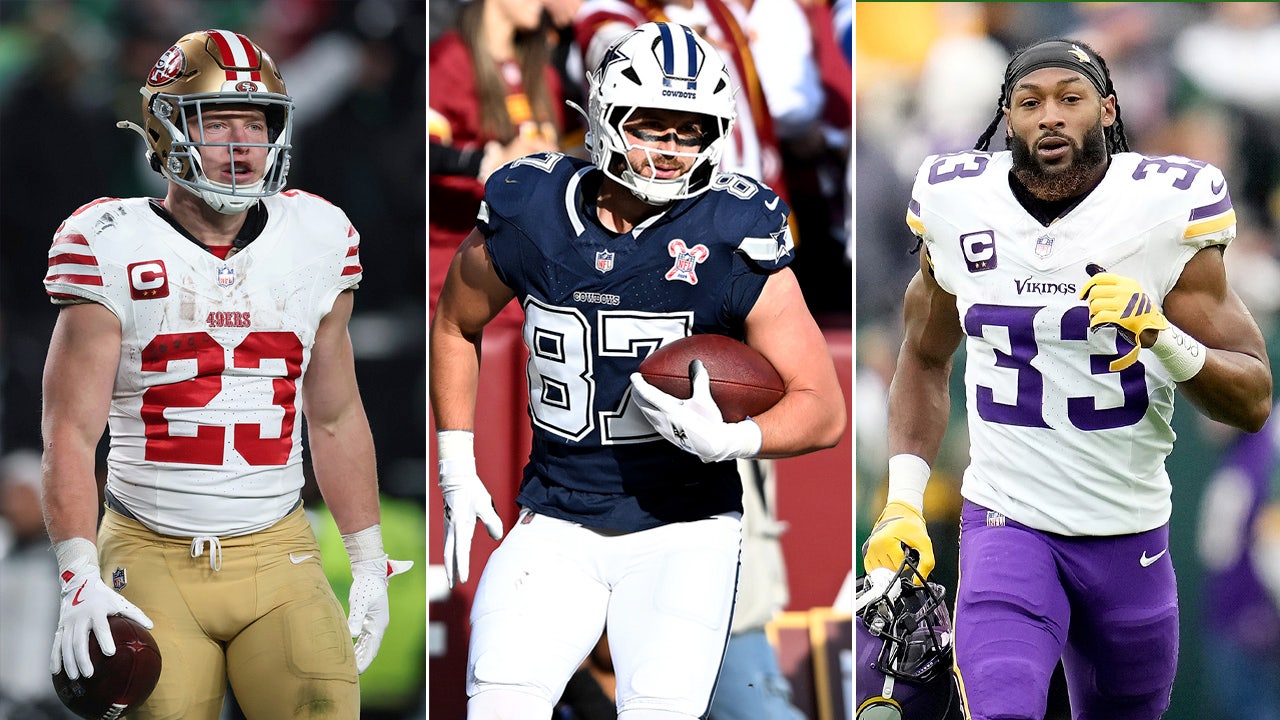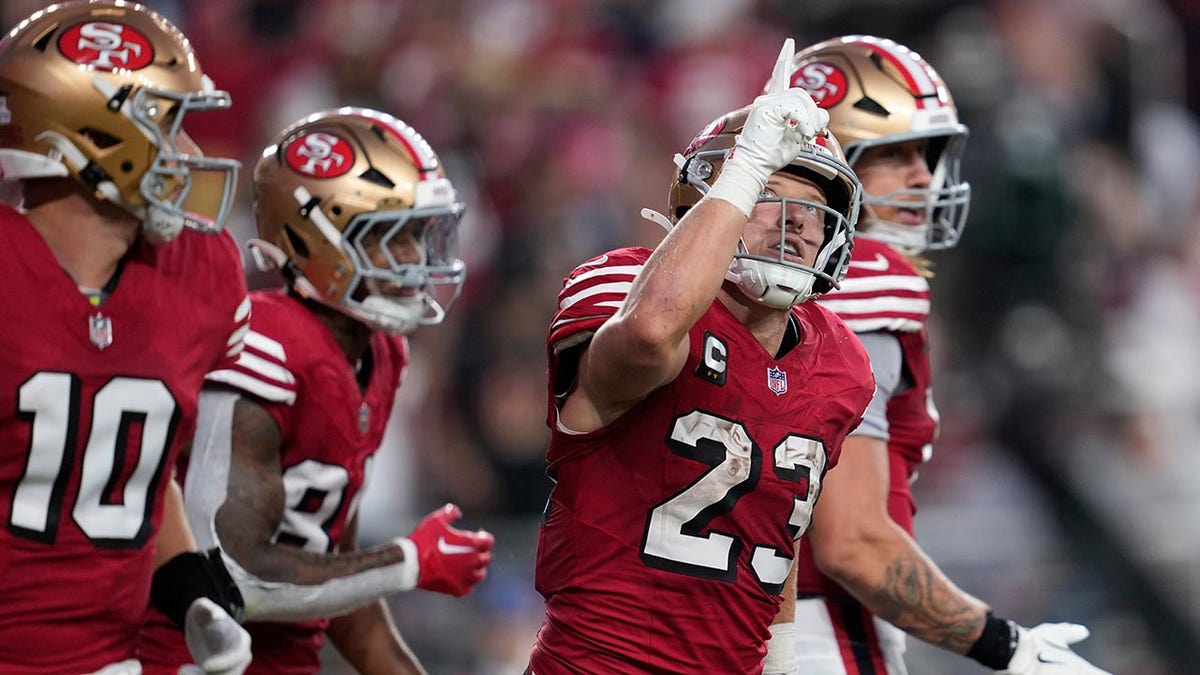Sports
‘You could feel it like in your bones’: Aaron Judge meets his October moment at last

NEW YORK — Never were the questions of Aaron Judge‘s fitness for October particularly fair, but that’s life for the biggest man in the biggest city whose biggest failures had come at the biggest times. The burden of greatness is heavy. The burden of greatness in New York is planetary. And for those unleashing screeds on Judge’s postseasons — on hot take shows and sports-talk radio and in bars and at family dinners and everywhere, really, that anyone talks about the Yankees — it was never about whether they were fair. After all, his performances had been undeniably foul.
Judge never paid any of this any mind because he does not wire himself to do so. He cares about winning. He cares about success. He cares more than anyone who criticizes him, mocks him, derides him, leans into his past performances as if they’re predictive of an unknowable future. Judge always separated those struggles, not just because he needed to but because it is how he lives, purposely boring and boringly purposeful. He believed the moment would present itself and he would meet it. And why wouldn’t he think that? Every other endeavor in his baseball life had treated him that way.
Regardless of how the American League Division Series between the Yankees and Toronto Blue Jays breaks, what Judge did Tuesday night was the sort of thing that should put to rest questions about his October aptitude. It won’t, because it never could, but the wide-eyed, wonderstruck, childlike gawking of everyone in the Yankees’ clubhouse told the story of Tuesday night’s season-saving 9-6 victory against the Blue Jays in which Judge left jaws agape.
Poor Louis Varland. The right-handed reliever entered in the fourth inning to protect the Blue Jays’ 6-3 advantage in a game that could have clinched their spot in the AL Championship Series. He fooled Judge on a 90 mph curveball and then blew a 100 mph fastball by him and then threw another fastball at 100, up and in. Like, really in. Like, 5.9 inches off the inner corner of the plate, at triple digits, with tremendous carry, an absolute nightmare of a pitch for any hitter at any time in the game’s history to touch, let alone punish.
Nearly 400 feet later, when the ball banged off the left-field foul pole — the one place in Judge’s world where something foul is indeed fair — no one on the field could believe it. The absurdity of it all — manipulating his 6-foot-7, 282-pound body to so thoroughly alter his standard bat path, turn on 100 and keep it fair — was not lost on Varland, the Yankees who kept watching replays of the swing in the dugout, or the 47,399 at Yankee Stadium who bore witness.
“He made a really good pitch look really bad,” Varland said.
All postseason, Judge has been doing that. His 11 playoff hits lead MLB. For all of the ugliness of striking out with the bases loaded in Game 1 of this ALDS, his at-bats have been competitive all October. What he did to Varland was the culmination, precisely what the Yankees needed to see another day.
“You could feel it like in your bones,” Yankees reliever Tim Hill said. “It was crazy. It was amazing. I mean, just the pitch that he hit. All that. I’m sure my guy over there on the other side is questioning everything.”
Yes, pitching to Aaron Judge is the sort of thing of which existential crises are made. Before Tuesday, he had never hit a pitch 100 mph or faster for a home run. He hit 53 home runs this season — and none on a pitch outside the rulebook strike zone. Before Tuesday, the Blue Jays were 39-0 this season in games during which they led by at least five runs, too.
It’s impossible to overstate how out of character this was for Judge. He prides himself on good swing decisions because he knows how important they are. On pitches in the strike zone this season, Judge batted .400, 40 points higher than the next-best hitter. He slugged .867, 115 points higher than Shohei Ohtani. In his 214 plate appearances this year that ended on pitches outside of the rulebook zone, Judge batted .109 and drove in one run. All year. He didn’t have a single extra-base hit on such pitches.
One of the biggest home runs in the career of a two-time MVP favored to win a third this year was on something he never does. And if a willingness to exit his comfort zone and in the process do something that few in the history of baseball would be physically capable of doing doesn’t show that Judge isn’t just capable of success in October but destined for it, well, nothing would. And that’s fine with him. He knows emotion is the fuel that feeds the prognostications of inevitable letdown, not consistency or logic.
“I get yelled at for swinging at them out of the zone, but now I’m getting praised for it,” Judge said. “It’s a game. You’ve got to go out there and play. I don’t care what the numbers say or where something was at. I’m just up there trying to put a good swing on a good pitch, and it looked good to me.”
Inside the Yankees’ clubhouse, they’ve been yearning for Judge to have a game like this, to further validate their unflinching belief in him. The past is indisputable. Judge’s postseason OPS is more than 250 points lower than during the regular season. The Yankees haven’t won a championship during his 10 years in the big leagues. It’s real, and it’s regrettable, and it’s part of his legacy. It is also not the ink with which the future is written, which is why Aaron Boone, the Yankees’ manager with whom Judge is extremely close, said: “I don’t worry about Aaron and his state, even understanding all the outside noise.”
From Boone’s perch atop the dugout, he had the perfect view of the left-field foul pole. As the ball carried through the night, Judge stood near home plate. He didn’t pull a Carlton Fisk, trying to wave it fair. He just waited for it to land.
And when it did, helping raise his batting average this postseason to .500 and his OPS to 1.304 — nearly 300 points better than his career regular-season OPS, for the record — Judge uncorked a mini-bat flip and started his jog around the bases. When he got back to the dugout, teammates lined up and greeted him with a full high-five line.
“He’s the real deal, and as beloved a player as I’ve ever been around by his teammates,” Boone said. “They all admire him, look up to him, respect him, want his approval, and that’s just a credit to who Aaron is and how he goes about things.”
After slapping the last hand, Judge took one more step toward the end of the dugout. There awaited a television camera. Judge looked at it, pointed and turned around. He then pirouetted back and gave the audience one more stare. This was not an accident. Nothing Judge does is. It was a message, a reminder, a siren for everyone that didn’t believe.
The Yankees were still alive. And as long as that’s the case, he plans on carrying them. Even in October.
Sports
20 charged in college hoops point-shaving plot

Twenty men have been charged in a point-shaving scheme involving more than 39 college basketball players on more than 17 NCAA Division I teams, leading to more than 29 games being fixed, according to a federal indictment unsealed Thursday in the Eastern District of Pennsylvania.
Fifteen of the defendants played college basketball during the 2023-24 and/or 2024-25 seasons, according to the indictment. Some have played this season. Two of the players named in the indictment, Cedquavious Hunter and Dyquavian Short, were sanctioned in November by the NCAA for fixing New Orleans games.
At least two of the defendants, Shane Hennen and Marves Fairley, were also charged in a federal indictment in the Eastern District of New York centered on gambling schemes in the NBA.
Former NBA player Antonio Blakeney was named but not charged in the indictment. The indictment describes Blakeney as being “charged elsewhere.”
The scheme, according to the indictment, began around September 2022 and initially was focused on fixing games in the Chinese Basketball Association. The group later targeted college basketball games, offering bribes to college players ranging from $10,000 to $30,000 to compromise games for betting purposes, according to the indictment.
“In placing these wagers on games they had fixed, the defendants defrauded sportsbooks, as well as individual sports bettors, who were all unaware that the defendants had corruptly manipulated the outcome of these games that should have been decided fairly, based on genuine competition and the best efforts of the players,” the indictment said.
Sports
3 Pro Bowl players named finalists for NFL’s Salute to Service Award

NEWYou can now listen to Fox News articles!
USAA on Thursday announced the three finalists for the NFL’s Salute to Service Award, and a dynasty in San Francisco could be on the rise.
After 49ers star George Kittle took home the award last year, Christian McCaffrey is among three finalists for the league’s award, along with Dallas Cowboys tight end Jake Ferguson and Minnesota Vikings running back Aaron Jones as the finalists — Jones was a finalist last year, as well.
“The finalists for the 15th Annual Salute to Service Award presented by USAA have used their platforms to be exceptional advocates for the military community, reminding us that service doesn’t stop when the uniform comes off,” Maj. Gen. (Ret.) Bob Whittle, Senior Vice President and Head of Military Affairs at USAA, said in a release.
CLICK HERE FOR MORE SPORTS COVERAGE ON FOXNEWS.COM
Christian McCaffrey, Jake Ferguson and Aaron Jones are this year’s Salute to Service Award finalists. (, G Fiume, and John Fisher/Getty Images)
“The NFL and USAA applaud Jake Ferguson, Aaron Jones, and Christian McCaffrey as deserving finalists who have demonstrated exactly what the award stands for — using the power of football to connect with, empower, appreciate and uplift our service members, veterans and their families.”
McCaffrey launched 23 and Troops in 2021 to focus on post-traumatic stress and athlete-level care for veterans. The foundation has raised $700,000 for military support and paid off holiday layaway for 515 military families.

San Francisco 49ers running back Christian McCaffrey (23) celebrates his touchdown against the Atlanta Falcons in the first half of an NFL football game, Sunday, Oct. 19, 2025, in Santa Clara, California. (AP Photo/Godofredo A. Vásquez)
Ferguson has partnered with USAA to visit local military bases and supported the National Medal of Honor Museum, including an event in 2024 in which 900 students joined in person and thousands more virtually.
Jones grew up in a military household. His father, Alvin, served 29 years in the Army, while his mother, Vurgess, served for 27. Jones’ older brother, Xavier, serves in the Air Force. Jones and his twin brother, Alvin Jr., founded the A&A All the Way Foundation in 2020 to support the youth of military families.
The winner will be announced at NFL Honors in San Francisco on Feb. 5, the same night the MVP, Offensive and Defensive Players and Rookies, and Coach of the Year will be crowned.

George Kittle of the San Francisco 49ers celebrates after a touchdown with Christian McCaffrey of the San Francisco 49ers during the fourth quarter in the game against the Seattle Seahawks at Levi’s Stadium on Dec. 10, 2023, in Santa Clara, California. (Thearon W. Henderson/Getty Images)
CLICK HERE TO GET THE FOX NEWS APP
Whittle and Kittle will be among those on the judging panel for the award.
Follow Fox News Digital’s sports coverage on X, and subscribe to the Fox News Sports Huddle newsletter.
Sports
Want to go to the national championship game? Got (at least) $2,700?
Monday night’s game featuring hometown Miami and championship-starved Indiana is one of the toughest tickets in sports.
Source link
-

 Politics1 week ago
Politics1 week agoUK says provided assistance in US-led tanker seizure
-

 Entertainment1 week ago
Entertainment1 week agoDoes new US food pyramid put too much steak on your plate?
-

 Entertainment1 week ago
Entertainment1 week agoWhy did Nick Reiner’s lawyer Alan Jackson withdraw from case?
-

 Business1 week ago
Business1 week agoTrump moves to ban home purchases by institutional investors
-

 Sports5 days ago
Sports5 days agoClock is ticking for Frank at Spurs, with dwindling evidence he deserves extra time
-

 Sports1 week ago
Sports1 week agoPGA of America CEO steps down after one year to take care of mother and mother-in-law
-

 Business1 week ago
Business1 week agoBulls dominate as KSE-100 breaks past 186,000 mark – SUCH TV
-
Sports6 days ago
Commanders go young, promote David Blough to be offensive coordinator






